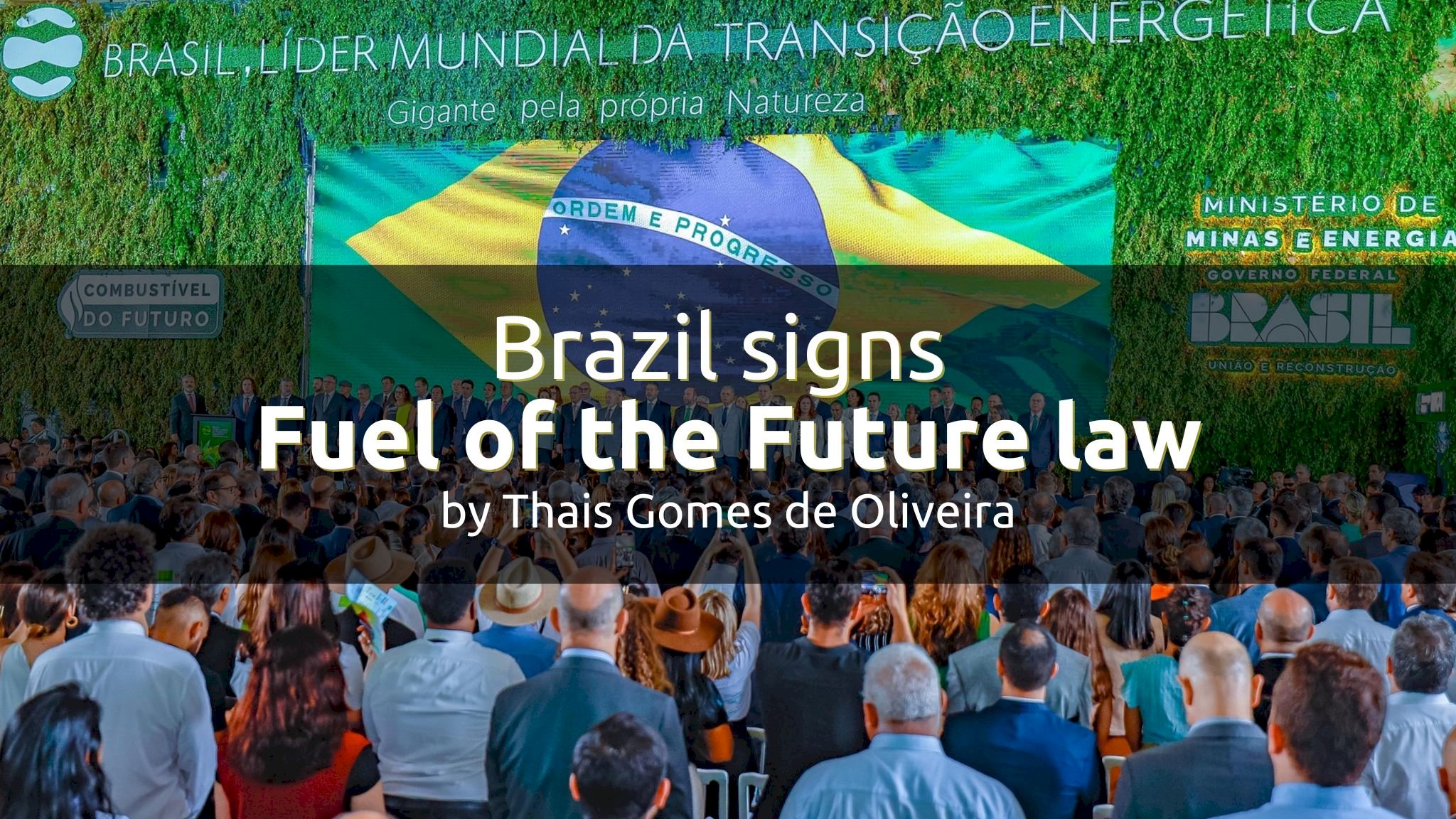Brazil signs Fuel of the Future law
Reading time: approximately 3m15s
Discover how the Future Fuel Law (Law 14.993/2024) is driving the growth of biogas and biomethane, accelerating the decarbonization of Brazil's energy sector while fostering innovation and sustainability.

Brazil signs Fuel of the Future law
Driving Biogas and Biomethane in the Decarbonization of the Brazilian Energy Sector
By Thais Gomes de Oliveira,
Sanctioned on October 8, 2024, the Law No. 14.993/2024, known as the Future Fuel Law, originates from the Bill 528/2020. This law addresses the promotion of low-carbon sustainable mobility and the geological capture and storage of carbon dioxide, as well as establishing the National Sustainable Aviation Fuel Program (ProBioQAV), the National Green Diesel Program (PNDV), and the National Decarbonization Program for Natural Gas Producers and Importers and Biomethane Incentive.
The new legislation changes the minimum and maximum limits for the blend of anhydrous ethanol in C gasoline and the blend of biodiesel in diesel sold to the final consumer. A relevant aspect is the integration of this law with other important initiatives, such as the National Biofuels Policy (RenovaBio), the Green Mobility and Innovation Program (Mover Program), the Brazilian Vehicle Labeling Program (PBEV), and the Vehicle Emissions Control Program (Proconve), which could enhance the effectiveness of public policies aimed at sustainability.
Specifically regarding biogas and biomethane, the law creates the National Decarbonization Program for Natural Gas Producers and Importers and Biomethane Incentive, with the main goal of promoting the use of biogas and biomethane in Brazil, integrating these renewable sources into the national energy matrix. Its targets include stimulating the production and consumption of biogas and biomethane, promoting vehicles and agricultural machinery powered by methane, and encouraging the replacement of diesel engines. Additionally,
the program aims to foster infrastructure projects to connect biomethane production plants to natural gas distribution networks, as long as they are economically viable.
Starting in 2026, natural gas producers and importers will have to meet annual greenhouse gas emission reduction targets (GHG), beginning at 1% and potentially reaching 10%. The National Petroleum Agency (ANP) will be responsible for monitoring these targets, as well as defining the calculation methodologies to verify the emission reductions.
Thus, the Future Fuel Law, and especially the Biomethane Incentive Program, represent an important step for Brazil in transitioning to a low-carbon economy. By promoting biogas and biomethane as viable and sustainable alternatives in the energy sector, the country advances in fulfilling its environmental commitments and diversifying its energy matrix, significantly contributing to the reduction of greenhouse gas emissions.
References
-
BRAZIL. Law No. 14.993, of October 8, 2024. Provides for the promotion of low-carbon sustainable mobility and the geological capture and storage of carbon dioxide; establishes the National Sustainable Aviation Fuel Program (ProBioQAV), the National Green Diesel Program (PNDV), and the National Decarbonization Program for Natural Gas Producers and Importers and Biomethane Incentive; amends Laws No. 9.478, of August 6, 1997, 9.847, of October 26, 1999, 8.723, of October 28, 1993, and 13.033, of September 24, 2014; and revokes a provision of Law No. 10.438, of April 26, 2002. Official Gazette of the Union: section 1, Brasília, DF, October 8, 2024. Available at: <planalto.gov.br/lei-14993>
Other articles by the author
- The Role of Biogas in Mitigating Global Warming
- The "new" Ministry of Environment and Climate Change in the face of the non-existent Brazilian carbon market
About the author
Thais Gomes de Oliveira, lawyer at Oliveira Law Firm, Master in Agribusiness - UFG, Specialist in Environmental Law - UFPR, MBA in Strategic Management in Renewable Natural Energies - UFPR, Specialist in Criminal Sciences - Universidade Anhanguera Uniderp.
Did you enjoy the topic?
Want to know more about biogas in Brazil?
Author: Thais Gomes de Oliveira. Published on: October 15, 2024.
This article is not authored by Portal Energia e Biogás, therefore, the credits and responsibility for its content lie with the author. Portal Energia e Biogás provides the Communities & Biogas Producers space for experts to publish opinion and technical content related to the biogas and biomethane market. The texts are evaluated by the portal's editorial team, which determines the possibility of publication. The opinions expressed in this space do not necessarily reflect the views of Portal Energia e Biogás.









NOTICE! The space for comments is intended for a healthy debate of ideas. Posts containing inappropriate expressions or personal attacks on the publication team, another user or any identified group or individual will not be accepted. If this occurs, we reserve the right to delete the comment to maintain a respectful environment for discussion.